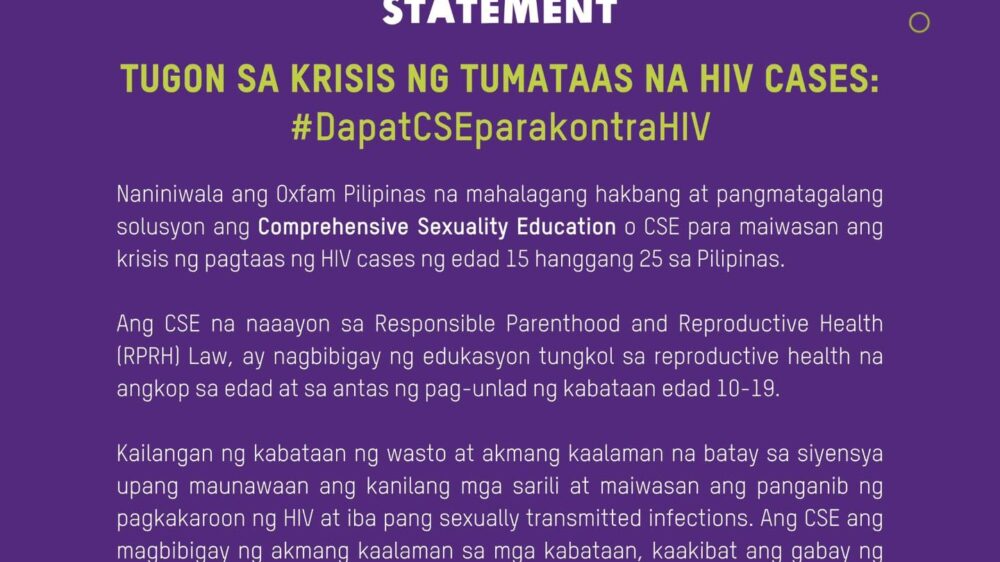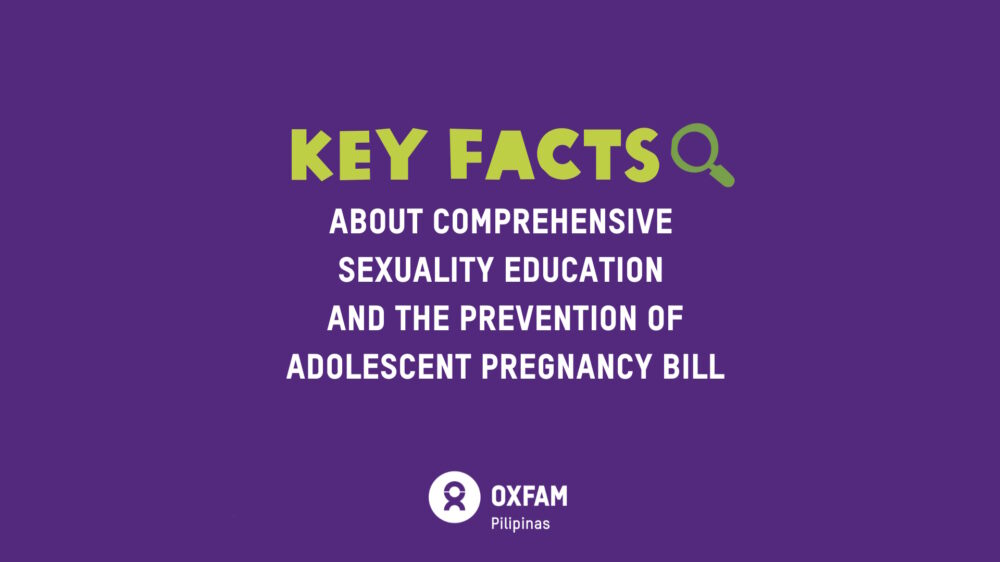Marking the national women’s month, the Senate Committee on Women, Children, Family Relations, and Gender Equality tackled on Wednesday Senate Bills that endeavors to strengthen a comprehensive policy in addressing adolescent pregnancy through social protection.
In a statement, Oxfam Pilipinas Executive Director Erika Geronimo commended these proposed legislative bills, saying “they are a welcome development in realizing an extensive policy that will address adolescent pregnancy in the country.”
Geronimo adds that, “the recent response and actions taken by the members of the Senate Committee signify their commitment towards a rights-based approach in addressing sexual and reproductive health and rights matters, although there is much to be done to ensure it is reflected in the proposed bill”.
Adolescent Pregnancies in the Philippines
Recent findings from the 2022 National Demographic and Health Survey (NDHS) showed that teenage pregnancy among 15-19 years old has declined from 8.6% in 2017 to 5.4% in 2022. This is a welcome development needing further scrutiny and analysis because of possible factors attributing to the COVID 19 lockdown in 2020-2021.
The Commission on Population and Development (POPCOM), however, is raising concern over the high number of early pregnancies among the 10-14 years old which is about 2,000 pregnancies recorded across the country.
Among girls aged 15 to 19 years, only 13.4% have a correct knowledge of the fertile period, and seven out of 10 first premarital sex activities are unprotected (PSA, 2017).
According to the World Bank, the Philippines has 47 births annually per 1,000 women aged 15-19, higher than the average adolescent birth rates of 44 globally and 33.5 in the ASEAN region.
Legal Frameworks on SRHR
Legal frameworks such as the Republic Act 10354 (Responsible Parenthood and Reproductive Health Law of 2012), Executive Order 141 Series of 2021 adopting a whole-of-government approach to addressing teenage pregnancy, and the Republic Act 11166 or the Philippine HIV and AIDS Policy Act of 2018 legitimatizes the need to address sexual and reproductive health and rights (SRHR) issues and concerns of individuals.
Nevertheless, many of these do not provide universal access to SRHR commodities and services, especially for adolescents.
Inclusive and gender-responsive bills urged
Based on Oxfam Pilipinas’ recommendations for Senate Bills 1209, 372, and 651, the technical working group led by the Committee on Women, Children, Family Relations, and Gender Equality agreed to revise the age range of adolescence from 10 to 21 to 10 to 19 aligned with the World Health Organization (WHO).
Oxfam Pilipinas also called for the recognition of young women and men regardless of their sexual orientation, gender identity, gender expression and sex characteristics (SOGIESC) as rights holders.
It also stressed that sexuality and sexual rights should be seen as part of basic human rights which involved informed choices, feelings, love, and desires to develop intimate and safe relationship and pleasure. Thus, it is also recommended that the bills uphold the “sexual” component of SRHR by including the said term.
The organization also urged that women’s rights organizations (WROs) and youth-led organization (YLOs) be included in the Adolescent Pregnancy Prevention Council.
Being aware of the lived realities of adolescent victims of violence and abuse, the TWG must therefore ensure that the bill will grant adolescents the right for protection from all forms of violence and abuse.
The whole section on Universal Access to SRHR services and products was revised, reflecting that adolescents who are 15-19 years old shall be allowed to access SRHR products regardless if they are sexually active or a victim of sexual violence and abuse.
“It is indeed promising that the proposed bills ensure social protection for adolescent mothers, parents, and their children and its present form is now inclusive of the rights of LGBTQIA+ adolescents, adolescents with disabilities, and the IP and Moro groups. However, there is still much to be done to make it fully supportive of a gender-responsive, inclusive, and universal national policy in addressing adolescent pregnancy,” Geronimo added.
###
Contact information
Ma. Paz “Pats” Oliva
Senior Officer for Media and Digital Influencing
moliva@oxfam.org.uk



